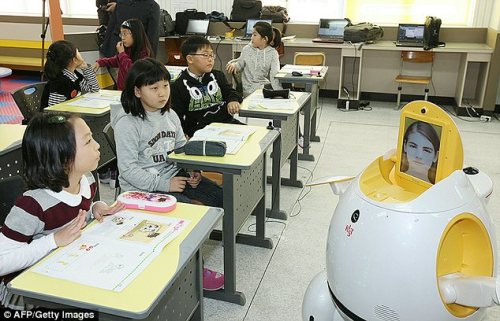Robo-teachers?
In the recent film “The Robot & Frank,” an elderly Dad, played by the fine actor Frank Langella, is slipping into dementia so his adult son and daughter debate how best to help him out: get him into an assisted care facility, says daughter. Get him a domestic robot, a caregiver that cooks, cleans up and converses with Frank, says son.
Son wins and brings a robot to his Dad’s home to start care-giving. The sharp tensions between Frank and the mechanical caregiver dissolve as Frank realizes that he can resume his previous career as a cat burglar with the aid of the robot. So with this comedic story-line dominating the film, the serious moments of Frank realizing that he will no longer be the person he was—-Langella captures those emotions without saying a word–are lost. Thus, what could have been an insightful film, a study of the crushing consequences of dementia on a person and family get twisted in the writers’ failure to decide whether they were doing a comedy or serious film.
But that film is not the point of this post.
The point is that while there are tasks that robots can do to help infirm elderly, ill patients, and students the connection between a machine and human being cannot replicate the fundamental cognitive and emotional bonds between humans that sustains caregiving, doctor-patient and teacher-student relationships.
And robo-caregivers, robo-doctors, and robo-teachers have surely entered the world of elderly care, medicine, and education.

